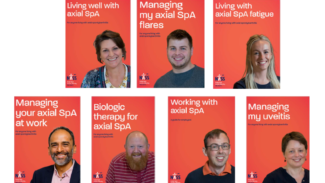
Family life
Read our top tips for people with axial SpA looking after children
Read moreThe latest information on planning for a family and pregnancy with axial SpA (AS)
This information is for anyone with axial spondyloarthritis, including people with ankylosing spondylitis
This section gives advice on:
The single most important piece of advice that we can give about planning a family is to discuss it with your rheumatology team in advance.
Many obstetrics services in the UK are now lead by community midwives. We recommend you explain to your midwife early on in your pregnancy that you have axial SpA and would like to see the obstetrician to develop a care plan tailored to your needs.
Your midwife will also be able to make sure you see the anaesthetist well in advance of your labour to discuss any concerns you may have and to ensure they fully understand your axial SpA and how it affects you.
Having axial SpA will not directly affect your ability to conceive. Men who take suplfasalazine may have reduced fertility. However, there isn’t much evidence to suggest that men should stop taking sulfasalazine when trying to conceive. The recommendation from the British Society for Rheumatology (BSR) is that if you’ve been trying for a baby for 12 months without success then discuss stopping the medication.
Do make sure you discuss this issue with your rheumatologist.
Having axial SpA does not have a harmful effect on the course of pregnancy or on the wellbeing of your unborn child. The rate of miscarriage, stillbirth, and small for gestational age infants among women with axial SpA is similar to that of other healthy women.
Women with axial SpA generally have healthy babies and they carry them to full term.
Women with axial SpA are no more likely than other healthy women to get pre-eclampsia or to go into premature labour.
There is no pattern to women’s axial SpA symptoms during pregnancy. Some find their symptoms improve, some find they stay more or less the same and others find they get worse.
Do ensure you ask your rheumatology team for the best way to contact them for advice between appointments, such as a Helpline, so that you can get support for axial SpA symptoms if they do occur.
It’s important for you to keep exercising for as long as possible during your pregnancy. This will help both with your general health and with your axial SpA. As your pregnancy advances and you gain weight you may find it easier to exercise in the swimming pool where the water will help to support your weight.
If you’re new to exercise, then speak to your rheumatology physiotherapist for advice on building exercise up gradually.
We know some women hope that they will be medication free during their pregnancy and while they are breast feeding.
The reality for some women is that you may need either to stay on your medication during your pregnancy or know what medications you can safely add in during flares. Everyone has different needs and that’s why it’s so important to discuss this with your rheumatology team, ideally in advance, so that you know what the best approach options are going to be available to you.
We’ve provided information on the different options below to help inform your discussions with your rheumatology team and GP. The information we have provided is based on guidelines from the British Society for Rheumatology which were updated on 1 November 2022. Watch the video at the bottom of this page for guidance from some of the guideline authors.
The advice on anti-inflammatories during pregnancy is divided into NSAIDs (including ibuprofen, naproxen and diclofenac) and COX-2-specific NSAIDs (including celecoxib and etoricoxib).
The British Society for Rheumatology (BSR) Guideline says NSAIDs:
The BSR Guideline notes that there is not enough data on the use of coxibs or COX-2-specific NSAIDs and therefore they should be avoided during conception and pregnancy.
Read the BSR guidelines on the use of NSAIDs and other pain relieving medications during pregnancy.
Methotrexate
Methotrexate at any dose should be avoided in pregnancy and stopped at least one month before you start trying for a baby. If you were taking methotrexate before you conceived it’s recommended that you take a folic acid supplement until you are 12 weeks pregnant. It’s not recommended that you use methotrexate when you are breatfeeding.
Sulfasalazine
Sulfasalazine is considered safe to take throughout your pregnancy. It’s recommended that you take folic acid when you are trying for a baby and during the first trimester of your pregnancy. It’s considered safe to breastfeed on sulfasalazine as long as you have carried your baby to full term and your baby is healthy.
Certolizumab pegol can be used throughout your pregnancy. Compared with other anti TNFs it has little or no placental transfer.
If you and your rheumatologist agree that you are a low risk of having a flare, then you could consider stopping:
This will mean that your baby can have the normal vaccination schedule, including rotavirus at 8 weeks.
If you and your rheumatologist believe that stopping your anti TNF might result in you having a flare, you can continue with your anti TNF throughout pregnancy. However, live vaccines should then be avoided until your baby is 6 months of age.
Anti TNF therapy can be used when you are breastfeeding. If you’ve chosen to stop your anti TNF during your pregnancy it can be started as soon as is practical after you’ve given birth.
Read the BSR guidelines on use of anti-TNF therapy during pregnancy.
The BSR believe there’s currently not enough evidence to be confident that anti IL 17A medications can be used during pregnancy. You should discuss stopping this medication in advance of a planned pregnancy. If you do become pregnant while taking an anti IL 17A it’s not thought likely that it would be harmful.
You should have a normal labour.
Sacroiliac joint or hip problems, even including a total hip replacement, should not necessarily stop you from giving birth naturally. There are different positions that you can use which would make you more comfortable. Talk about different positions to your midwife.
It’s a good idea to make an appointment to talk to your midwife (or ideally an anaesthetist) in advance about pain relief during your labour. Lots of women opt for an epidural during labour. Occasionally this may be technically more difficult to administer to women with axial SpA. Your midwife or anaesthetist will be able to tell you about other options that are available.
Your midwife will also be able to discuss in advance other pain relief, such as TENS machines, relaxation techniques and water birth.
We do know that caesareans do tend to be carried out more frequently among women with axial SpA. Sometimes this is because obstetricians prefer to do an elective caesarean section in women with inflammatory joint disease.
Some people do find their axial SpA flares after the birth. Do speak to your rheumatologist in advance on what medications are suitable if you are breastfeeding and other ways to manage your pain.
It can be demanding when looking after a new-born baby, so do speak to your health visitor about ways to reduce the stress on your body while feeding, changing and carrying baby.
For people who wish to breastfeed their baby, it can be helpful to speak to your midwife in advance about different positions you can use and how to place pillows for support. This can help you find a comfortable position for you and baby.
If you have difficulty with breastfeeding, do speak to your GP or health visitor.
We’ve come across a couple of guides to pregnancy and arthritis which you may find useful. You can open and download these guides by using the links below.

Read our top tips for people with axial SpA looking after children
Read more
Read our advice on relationships and intimacy for people with axial SpA
Read more
Download our free guides to help you learn more about managing your axial SpA
Read more